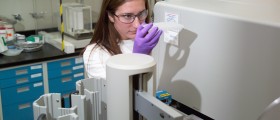
Prostate specific antigen is a certain type of glycoproteinencoded in the human body by the gene known as KLK3. It is also sometimesreferred to as Kallikrein-3, gamma seminoprotein or simply PSA. It belongs tothe family of kallikrein related peptidase and it gets secreted in theepithelial cells of the prostate gland. Its main purpose is to liquefy thesemen in the seminal coagulum once the ejaculation occurs. This is done so thatthe sperm may be able to swim freely. It also has another important purpose andthat is to dissolve the cervical mucus so that the sperm may enter freely. Menwith healthy prostates usually have it present only in small quantities, butthose who suffer from various different types of prostate related medicalproblems such as the prostate cancer usually have elevated levels of PSApresent in their prostates. The best way of early detection of prostate canceris a certain type of blood test which measures the PSA. The predictive value ofsuch tests is somewhere around 35 per cent.
PSA Is Not without Risk
There are certain risks associated with the screening tests.This is mainly due to the fact that those tests may not be perfect and thatthey miss some cancers which are present in the prostates of patients. They mayalso show things that may seem like tumors but in actuality they are not. The screeningtests are utterly unreliable as they may also find certain types of cancerwhich will never be associated with any health problems. In most cases, thereis no possible way of determining which cancers are harmful and which are not,so they all get treated the same way. In cases of harmful ones this is a goodthing, but there may also be cases in which the cancer treatment such as radiation,chemotherapy and surgical interventions are unnecessary and may cause more harmthan good. Blood samples taken from the vein are associated with much lessrisks than the screening tests. A person may only experience slight bruising atthe site where the needles was inserted into the vein. Some rare cases may alsoinvolve swelling of the veins after taking the blood sample. This condition ismedicinally referred to as phlebitis. People who suffer from different types ofbleeding disorders may also experience certain troubles with ongoing bleedingafter taking a blood sample. Blood sample tests should not be performed onpeople treated with medications called dutasteride and finasteride (these areused for the prevention of the enlargement of the prostate), people treatedwith larger doses of methotrexate or cyclophosphamide (used for the treatmentof cancer), people who had recent prostate surgery, prostate biopsy or a recentdigital rectal exam, people who recently suffered from some sort of urinarytract infections, people who recently had a catheter for the draining of urineor people who were recently sexually active.
Research for Improvement of PSA Test
There are still numerous studies conducted simply todetermine the exact benefits of screening for prostate cancer. The PLCO trialcurrently conducted by the National Cancer Institute includes the evaluation ofprostate, lung, colorectal and ovarian cancer screening tests. The main goal isto determine which tests are the most efficient in reducing the number ofdeaths triggered by cancers. The PSA test is one of the tests which is alsoevaluated, because there are chances of yearly screenings being able to detectprostate cancer and increase the patients’ chances of surviving this dreadedmedical condition. The trial and the initial results have unfortunately showedthat the PSA tests which lasted for 6 years did not actually reduce the numberof deaths in patients who suffer from prostate cancer. On the other hand, thesetests were successful in increasing the number of prostate cancer detected anddiagnosed by 23 per cent. The outcome of the results suggests that mendiagnosed with prostate cancer were treated with the usual treatment methods,but unfortunately there were cases in which the treatment options such asradiation therapy, chemotherapy and surgical intervention were completelyunnecessary and sometimes even harmful. There were several other largecontrolled trials of prostate cancer screening which have showed that the PSAtesting every 4 years can reduce the number of deaths triggered by prostatecancer by 20 per cent. The world of science is also constantly trying toimprove all the features and abilities of the PSA test. The most efforts arefocused on much more accurate distinguishing of cancerous conditions frombenign ones, slow growing cancers from fast growing ones and potentially lethalcancers from the harmless ones, and so on. There are certain types of methodswhich are studies and those include PSA velocity and PSA density. PSA velocityfocuses on following the changes in the levels of PSA over time. Sharp changesin the levels of PSA commonly indicate that there is something wrong going onin the prostate. PSA density is completely different as it focuses on therelationship between the size of the prostate and the levels of PSA containedin it. Another method which is currently studied is called free versus attachedPSA. It focuses on the relation between the free PSA and the PSA attached tomolecules of proteins. The last method currently studied is the alteration ofthe PSA cutoff level. It may be very efficient in reducing the risk ofunnecessary medical procedures.

















Your thoughts on this
Loading...